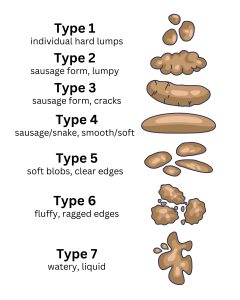8
Bowel and Bladder Health
Urination (micturition)
The bladder is a muscular, round organ responsible for storing urine, situated within the confines of the pelvic cavity. When fully filled, its size resembles that of a grapefruit, expanding to accommodate the increasing volume of urine. As a crucial component of the urinary system, the bladder functions collaboratively with the kidneys to filter waste products and excess fluids from the bloodstream, maintaining the body’s internal balance.
When the bladder reaches a certain level of fullness, specialized nerve signals alert the brain, triggering the need to urinate. To facilitate this process, the sphincter muscles, which control the urethral opening, must relax. As the bladder contracts, it effectively squeezes the stored urine out through the urethra. On average, most individuals will urinate approximately four to eight times a day, reflecting fluid intake, activity level, and overall health.
Indications of a healthy bladder:
- Urinate 4-8 times per day, roughly once every 3-4 hours
- Maintaining a steady stream for 8 seconds to indicate bladder is able to hold 400-600 ml of urine
- Waking up no more than once per night (if older than 65)
- Sense urge to urinate with enough time to get to a restroom
- Complete emptying of urine
- No leakage of urine
Bowel
The bowel is an essential tubular organ within the digestive system, extending from the stomach down to the anus. It consists of two main parts: the small intestine and the large intestine, commonly referred to as the small and large bowels, respectively.
The small intestine is where the majority of nutrient absorption occurs; it is a long, coiled structure that facilitates the breakdown of food into its simplest forms using various digestive enzymes. Meanwhile, the large intestine, also known as the colon, is primarily responsible for the absorption of water and electrolytes from indigestible food matter, ultimately transforming it into feces. This waste is then stored until it is expelled from the body during bowel movements.
The entire digestive process involves a series of intricate movements that allow food to pass through the bowel, typically taking between 24 and 72 hours. During this time, the digestive system efficiently breaks down food, absorbs vital nutrients and fluids, and removes waste to maintain the body’s energy levels and overall health. The bowel not only ensures the effective removal of waste but also balances fluid levels and nutrient absorption, playing a critical role in overall digestion and wellbeing.

Indications of a healthy bowel:
- Regular bowel movements, easy to pass, well-formed and soft (type 3 or 4 on Bristol Stool Chart)
- Bowel movements ranging from 1-3 times/day to 3 times/week
- Urge to have a bowel movement with enough time to wait a few moments before going to the restroom
- Completion of bowel movement in less than 60 seconds on toilet
- Pain-free bowel movements, minimal pushing required
- Complete emptying of bowel from colon
Key Takeaways
- Maintaining good bowel and bladder health is essential for disease prevention. It can also play a significant role in mitigating existing bowel and bladder control issues, leading to improved overall well-being.
References:
Australian Government Department of Health and Aged Care. (2019, December 11). What is bladder and bowel health? https://www.health.gov.au/topics/bladder-and-bowel/about-bladder-and-bowel-health/what-is-bladder-and-bowel-health
